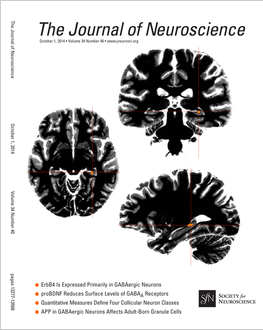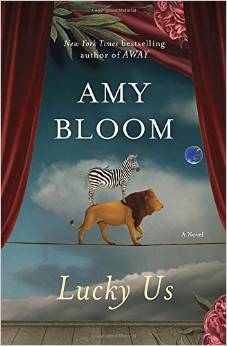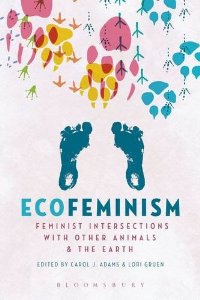Vera Schwarcz, the Mansfield Freeman Professor of East Asian Studies, professor of history, is the author of a new book titled Colors of Veracity: A Quest for Truth in China, and Beyond, published by the University of Hawai'i Press in November 2014. In Colors of Veracity, Schwarcz condenses four decades of teaching and scholarship about China to raise fundamental questions about the nature of truth and history. In vivid prose, she addresses contemporary moral dilemmas with a highly personal sense of ethics and aesthetics. Drawing on classical sources in Hebrew and Chinese (as well as several Greek and Japanese texts), Schwarcz…
Jan Naegele, Gloster Aaron and several Wesleyan researchers are the co-authors of an article titled "Long-Term Seizure Suppression and Optogenetic Analyses of Synaptic Connectivity in Epileptic Mice with Hippocampal Grafts of GABAergic Interneurons," published in the October 2014 edition of The Journal of Neuroscience, Issue 34(40): 13492-13504. Naegele is professor of biology, professor of neuroscience and behavior, and director of the Center for Faculty Career Development. Aaron is associate professor of biology, associate professor of neuroscience and behavior. The article is co-authored by Diana Lin '15; graduate students Jyoti Gupta and Meghan Van Zandt; recent alumni Elizabeth Litvina BA/MA '11, XiaoTing Zheng '14, Nicholas Woods '13 and…
Dana Royer, associate professor of earth and environmental sciences, is the co-author of “Plant Ecological Strategies Shift Across the Cretaceous-Paleogene Boundary,” published in PLOS Biology on Sept. 15. The study reveals that a meteorite that hit Earth 60 million years ago – and may have led to the mass extinction of the world’s dinosaur population – also led to a shift in the landscape of plants, particularly deciduous plants. Royer and his colleagues showed how they applied bio-mechanical formulas to fossilized leaves of flowering plants dating from the last 1.4 million years of the Cretaceous period and the first 800,000 of the Paleogene. Read more about…
Amy Bloom, the Distinguished University Writer-in-Residence and director of the Shapiro Center for Creative Writing, is the author of a novel, Lucky Us, published in July 2014 by Random House. Disappointed by their families, Iris, a hopeful star and Eva the sidekick, journey through 1940s America in search of fame and fortune. Iris’s ambitions take the pair across the America of Reinvention in a stolen station wagon, from small-town Ohio to an unexpected and sensuous Hollywood, and to the jazz clubs and golden mansions of Long Island. With their friends in high and low places, Iris and Eva stumble and shine…
Professor Lori Gruen is the co-editor of a new book titled Ecofeminism: Feminist Intersections with Other Animals and the Earth, published by Bloomsbury Academic in July 2014. Gruen is chair and professor of philosophy, professor of environmental studies, and professor of feminist, gender and sexuality studies. She also co-coordinates Wesleyan Animal Studies. In this 288-page book, leading feminist scholars and activists introduce and explore themes central to contemporary ecofeminism. Ecofeminism: Feminist Intersections with Other Animals and the Earth first offers an historical, grounding overview that situates ecofeminist theory and activism and provides a timeline for important publications and events. This…
Francis Starr, professor of physics, and Paul Hanakata ’14 are the co-authors of a new article published in the journal Nature Communications on June 16. The article, titled "Interfacial Mobility Scale Determines the Scale of Collective Motion and Relaxation Rate in Polymer Films,” is based off Hanakata’s senior thesis research at Wesleyan. Thin polymer films are ubiquitous in manufacturing and medical applications. Their chemical and mechanical properties make them suitable as artificial soft biological tissue and there has been intense interest in how film thickness and substrate interactions influence film dynamics. The nature of polymer rearrangements within these films determines their potential applications. However, up to now, there has been no way to readily…
Ellen Thomas, research professor of earth and environmental sciences, is the author of a paper titled "Rapid and sustained surface ocean acidification during the Paleocene-Eocene Thermal Maximum," published in Paleoceanography, May 2014. In this paper Thomas and her colleagues document that ocean acidification of the surface ocean not only occurred during past times of global warming and high CO2 levels, but also by how much — about 0.3 pH units. The group studied planktic foraminifers from a drill site in the North Pacific. Thomas' study has been highlighted in a press release from Columbia University and also on Phys.org.
Hilary Barth, associate professor of psychology, associate professor of neuroscience and behavior, is the co-author of of "Preschoolers trust novel members of accurate speakers’ groups and judge them favorably," published in the Quarterly Journal of Experimental Psychology, Issue 67, pages 872-883, in 2014. The paper is based on work from BA '08/MA '09 student Keera Bhandari's thesis, and research by former undergraduates Kyle MacDonald '10 and Jenn Garcia '10, and former lab manager Elizabeth Chase. It is known that by age 3, children track a speaker's record of past accuracy and use it as a cue to current reliability. Through two different experiments,…
Bill Craighead, assistant professor of economics, is the author of a paper titled "Monetary Rules and Sectoral Unemployment in Open Economies" published in the June 2014 issue of the Journal of Macroeconomics. Search theory has given us a more realistic mechanism to study unemployment in macroeconomic models. In this paper, Craighead integrated search theory into an “open economy” macroeconomic model – i.e., a model of an economy that interacts with the rest of the world. One important question in open economy models is what measure of inflation should monetary policy respond to – consumer prices, which include imported goods, or producer…
The broad contextual education that Wesleyan and peer institutions offer is frequently critiqued, sometimes excoriated, by those who accuse it of not preparing graduates for success in today’s world. But that accusation, says President Michael S. Roth in his sixth and latest book, Beyond the University: Why Liberal Education Matters (Yale University Press, 2014), is as old as liberal education itself – and never less convincing than now. A historian whose previous scholarship has focused on making sense of the past, Roth charts the development of pragmatic liberal education through a succession of important American thinkers. Liberal education has deep…
Sonali Chakravarti, assistant professor of government, is the author of Sing the Rage: Listening to Anger after Mass Violence, published by University Of Chicago Press on April 23. In Sing the Rage, Sonali Chakravarti examines the relationship between anger and justice through a careful look at the emotionally charged South African Truth and Reconciliation Commission. Between 1996 and 1998, the commission saw, day after day, individuals taking the stand to speak—to cry, scream, and wail—about the atrocities of apartheid. Uncomfortable and surprising, these public emotional displays, she argues, proved to be of immense value, vital to the success of transitional justice and…
Wesleyan President Michael S. Roth is the author of the book, Beyond the University: Why Liberal Education Matters, published by Yale University Press in May 2014. From Yale University University Press: “Contentious debates over the benefits—or drawbacks—of a liberal education are as old as America itself. From Benjamin Franklin to the Internet pundits, critics of higher education have attacked its irrelevance and elitism—often calling for more vocational instruction. Thomas Jefferson, by contrast, believed that nurturing a student’s capacity for lifelong learning was useful for science and commerce while also being essential for democracy. In this provocative contribution to the disputes, Roth focuses on…






